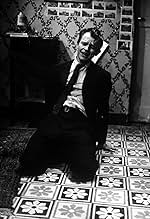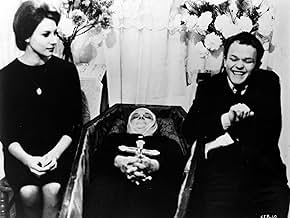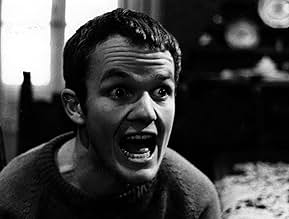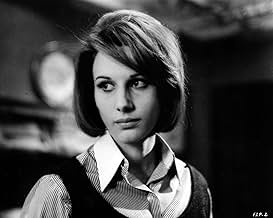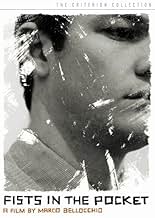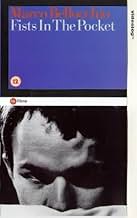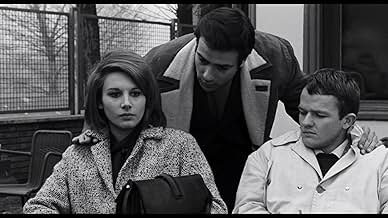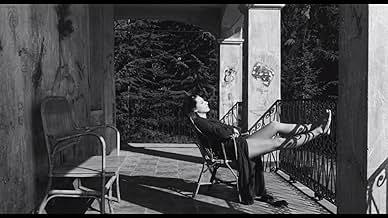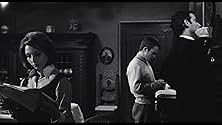IMDb-BEWERTUNG
7,5/10
5346
IHRE BEWERTUNG
Ein junger Mann ergreift drastische Maßnahmen, um seine dysfunktionale Familie von Ihren verschiedenen leiden zu befreien.Ein junger Mann ergreift drastische Maßnahmen, um seine dysfunktionale Familie von Ihren verschiedenen leiden zu befreien.Ein junger Mann ergreift drastische Maßnahmen, um seine dysfunktionale Familie von Ihren verschiedenen leiden zu befreien.
- Auszeichnungen
- 4 Gewinne & 5 Nominierungen insgesamt
Pier Luigi Troglio
- Leone
- (as Pierluigi Troglio)
Jeannie McNeil
- Lucia
- (as Jenny Mac Neil)
Empfohlene Bewertungen
Marco Bellocchio directs his first full-length film, and it's already a masterpiece, a milestone in the history of Italian cinema.This movie is all about contemporary uneasiness and family crisis in today's society (only, some two decades in advance). Every time I hear of family massacres on the news, I've got to think about problematic, disturbed Lou Castel deciding to get rid of his mother and younger brother for the benefit of the eldest, embodying not only a stage of criminality, but above all a wrong philosophy, a twisted point of view about life, a failed maturity. Ennio Morricone' score is just perfect, fully successful in his aim to highlight the dramatic potential of the story. Lou Castel has never acted like this, his grimacing and his usage of the dead moments are unforgettable. The frames of the mother's death are like an howl, they "send shivers down your spine". A must-see.
The family in Marco Bellocchio's startling debut "Fists in the Pocket" make the Femms of "The Old Dark House" seem normal. These indolent Italians laze around all day taunting each other at every opportunity while son Allessandro, (a truly terrific Lou Castel), contemplates the best ways to rid himself of the others, including his blind mother, for the sake of the one brother he cares about. This darkly funny satire wasn't like other Italian films of the time, taking an almost putrid look at the family values Italians hold most dear; a comedy about matricide, fratricide and possible incest that actually manages to be quite touching at times. It's also a movie that takes its time. For a director making only his first feature, Bellocchio bravely put narraitve on the back-burner opting instead for an atmosphere as lazy as his characters and killing off a number of sacred cows in the process. The Establishment hated it while young critics loved it though not enough to make it anything other than a cult movie and it's seldom revived. Perhaps its reputation outweighs its numerous qualities but however you look at it, it's a one-off and well worth seeing.
Pimpin places a call to his favorite writer Michel Houellebecq.
Pimpin: Hello.
Michel: Hello. Who is this?
Pimpin: Michel, its me Pimpin.
Michel: What do you want?
Pimpin: Sorry to disturb. I wanted to discuss a film that I watched. I wanted to hear your thoughts on it. Its this Italian film - Fists in the Pocket by Marco Belloccio. Came out in the 60s.
Michel: OK.
Pimpin: What do you think about it?
Michel: It did have a couple of nice pieces of ass. Paola Pitagora was unforgettable.
Pimpin: Hahahha. I agree. What did you think about the film?
Michel: Well, it was one of those films where the protagonist rebelled against his family and Catholic values. You know what I think about all that stuff, Pimpin. Nothing good came out of it. Sure, a lot of people escaped their families. And then they went and lived alone. Did drugs. Drank a lot. Individuality and personal freedom. Look at where all that got Europe now.
Pimpin: I thought the film was quite slow.
Michel: Its a piece of crap. But then, it was made in the 60s.
Pimpin: I did some research on it. The film apparently predicted the student and youth riots of the late 60s in Italy.
Michel: Hahahah. You really bought into all that crap?
Pimpin: I know its a bit like how Indian social commentators use crappy films like Deewar to explain the 70s and 80s.
Michel: Exactly. Its completely phony Pimpin.
Pimpin: I'm still confused. I don't know what to think about the film. I mean, the film is quite depressing.
Michel: Well, tell me something about the cinematography, pacing and background score. That would help us interpret it better.
Pimpin: It was a very stark film. Morricone's score was very bleak. The score is played during all the murder and post-murder scenes. It is one of Morricone's bleakest scores. I liked the way some of the scenes were framed. Like at the party where the rebellious protagonist is sitting alone and there are a lot of people dancing. He does not even drink. He has no bad habits. But he wants to kill off his family. The pacing was slow.
Michel: Did you identify with the film?
Pimpin: Sort of. But like I said it was too slow. The actors were great. The director was quite successful in capturing the claustrophobic environment in which the family lives.
Michel: Did you get married recently?
Pimpin: Yes.
Michel: So you are not to be trusted.
Pimpin: Why?
Michel: You would have liked this film a lot more during your wild bachelor days.
Pimpin: Thats probably true, Michel.
Michel: It is.
Pimpin: I did think that it was a very personal film. I mean, the director is very talented. He did portray the ills of the bourgeois life and the life lived on pure instinct quite well. I don't think he was rooting for either.
Michel: Did it work as a murder mystery?
Pimpin: No. I think it works best as the zeitgeist of that time in Italy. But it was quite boring for me.
Michel: OK. Is there anything else that you want to discuss?
Pimpin: The actors were great. I mean, most of them were better than the ones in the worst Indian movies. But I would not watch another movie because anyone of them were in it.
Michel: OK.
Pimpin: Read about he Paris attacks. Quite scary.
Michel: (Silence)
Pimpin: Hello?
Michel: Pimpin, you weren't too impressed by this film. In fact, you were bored to death. You only called me because it had an 8 rating on IMDb.
Pimpin: You are right, Michel.
Michel: Take care, Pimpin.
Pimpin: Bye, Michel.
Michel: Bye
Pimpin: Hello.
Michel: Hello. Who is this?
Pimpin: Michel, its me Pimpin.
Michel: What do you want?
Pimpin: Sorry to disturb. I wanted to discuss a film that I watched. I wanted to hear your thoughts on it. Its this Italian film - Fists in the Pocket by Marco Belloccio. Came out in the 60s.
Michel: OK.
Pimpin: What do you think about it?
Michel: It did have a couple of nice pieces of ass. Paola Pitagora was unforgettable.
Pimpin: Hahahha. I agree. What did you think about the film?
Michel: Well, it was one of those films where the protagonist rebelled against his family and Catholic values. You know what I think about all that stuff, Pimpin. Nothing good came out of it. Sure, a lot of people escaped their families. And then they went and lived alone. Did drugs. Drank a lot. Individuality and personal freedom. Look at where all that got Europe now.
Pimpin: I thought the film was quite slow.
Michel: Its a piece of crap. But then, it was made in the 60s.
Pimpin: I did some research on it. The film apparently predicted the student and youth riots of the late 60s in Italy.
Michel: Hahahah. You really bought into all that crap?
Pimpin: I know its a bit like how Indian social commentators use crappy films like Deewar to explain the 70s and 80s.
Michel: Exactly. Its completely phony Pimpin.
Pimpin: I'm still confused. I don't know what to think about the film. I mean, the film is quite depressing.
Michel: Well, tell me something about the cinematography, pacing and background score. That would help us interpret it better.
Pimpin: It was a very stark film. Morricone's score was very bleak. The score is played during all the murder and post-murder scenes. It is one of Morricone's bleakest scores. I liked the way some of the scenes were framed. Like at the party where the rebellious protagonist is sitting alone and there are a lot of people dancing. He does not even drink. He has no bad habits. But he wants to kill off his family. The pacing was slow.
Michel: Did you identify with the film?
Pimpin: Sort of. But like I said it was too slow. The actors were great. The director was quite successful in capturing the claustrophobic environment in which the family lives.
Michel: Did you get married recently?
Pimpin: Yes.
Michel: So you are not to be trusted.
Pimpin: Why?
Michel: You would have liked this film a lot more during your wild bachelor days.
Pimpin: Thats probably true, Michel.
Michel: It is.
Pimpin: I did think that it was a very personal film. I mean, the director is very talented. He did portray the ills of the bourgeois life and the life lived on pure instinct quite well. I don't think he was rooting for either.
Michel: Did it work as a murder mystery?
Pimpin: No. I think it works best as the zeitgeist of that time in Italy. But it was quite boring for me.
Michel: OK. Is there anything else that you want to discuss?
Pimpin: The actors were great. I mean, most of them were better than the ones in the worst Indian movies. But I would not watch another movie because anyone of them were in it.
Michel: OK.
Pimpin: Read about he Paris attacks. Quite scary.
Michel: (Silence)
Pimpin: Hello?
Michel: Pimpin, you weren't too impressed by this film. In fact, you were bored to death. You only called me because it had an 8 rating on IMDb.
Pimpin: You are right, Michel.
Michel: Take care, Pimpin.
Pimpin: Bye, Michel.
Michel: Bye
I quit watching after 30 minutes, wasn't interested in the storyline and it seemed to be going nowhere. I found it boring and I wasn't interested in the characters.
This first effort by writer/director Marco Bellocchio has been called a drama by some, and a horror film by others. It is both. It is neither.
It is a view of a dysfunctional family. I almost had the impression they cam from a long line of incest like The People Under the Stairs. One wants to get away, another has epilepsy, the mother is blind, one seems to be developmentally disabled, and the last, Giulia (Paola Pitagora)is really not classifiable, but she sure seems to spend a lot of time very close to her brother Ale (Lou Castel).
Ale feels sorry for his older brother, Augusto (Marino Masé) and hatches a plan to drive the rest of the family, including himself off a cliff so his brother can get on with his life.
His plan fails, so he starts doing them in one by one.
Watching him is mesmerizing. You just have to see what he is going to try next. In the meantime, the family just acts as crazy as you would expect.
Bellocchio went on to direct many more great films including A Leap in the Dark, The Prince of Homburg, and The Religion Hour. It is amazing his first was so good.
It is a view of a dysfunctional family. I almost had the impression they cam from a long line of incest like The People Under the Stairs. One wants to get away, another has epilepsy, the mother is blind, one seems to be developmentally disabled, and the last, Giulia (Paola Pitagora)is really not classifiable, but she sure seems to spend a lot of time very close to her brother Ale (Lou Castel).
Ale feels sorry for his older brother, Augusto (Marino Masé) and hatches a plan to drive the rest of the family, including himself off a cliff so his brother can get on with his life.
His plan fails, so he starts doing them in one by one.
Watching him is mesmerizing. You just have to see what he is going to try next. In the meantime, the family just acts as crazy as you would expect.
Bellocchio went on to direct many more great films including A Leap in the Dark, The Prince of Homburg, and The Religion Hour. It is amazing his first was so good.
Wusstest du schon
- WissenswertesThe house, the film's main location, is the house director Marco Bellocchio spent his childhood days in.
- PatzerWhen the whole family is having dinner, Augusto is seated at one corner of the table and the mother is sitting on a side at the other corner. The cat is shown to be eating meat off the mother's plate in one scene, but in the next scene Augusto is shown picking up the cat as if was right next to him on the table. Once he removes the cat, the next camera angle again shows Augusto and the mother at opposite ends.
- Zitate
Alessandro: I'm a volcano of ideas.
- VerbindungenEdited into Sorelle (2006)
- SoundtracksExcerpt from La Traviata
composed by Giuseppe Verdi (uncredited)
lyrics by Francesco Maria Piave (uncredited)
Top-Auswahl
Melde dich zum Bewerten an und greife auf die Watchlist für personalisierte Empfehlungen zu.
- How long is Fists in the Pocket?Powered by Alexa
Details
- Erscheinungsdatum
- Herkunftsland
- Offizielle Standorte
- Sprachen
- Auch bekannt als
- Fists in the Pocket
- Drehorte
- Produktionsfirma
- Weitere beteiligte Unternehmen bei IMDbPro anzeigen
- Laufzeit1 Stunde 50 Minuten
- Farbe
- Sound-Mix
- Seitenverhältnis
- 1.85 : 1
Zu dieser Seite beitragen
Bearbeitung vorschlagen oder fehlenden Inhalt hinzufügen

Oberste Lücke
By what name was Mit der Faust in der Tasche (1965) officially released in India in English?
Antwort
![Trailer [OV] ansehen](https://m.media-amazon.com/images/M/MV5BNjc5ZDU5NDgtZTliZC00MjQwLThjNjItMDhjZmFmZGMxZTI2XkEyXkFqcGdeQXRyYW5zY29kZS13b3JrZmxvdw@@._V1_QL75_UY281_CR6)
